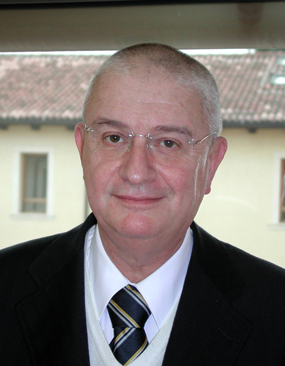Studying at the University of Verona
Here you can find information on the organisational aspects of the Programme, lecture timetables, learning activities and useful contact details for your time at the University, from enrolment to graduation.
Academic calendar
The academic calendar shows the deadlines and scheduled events that are relevant to students, teaching and technical-administrative staff of the University. Public holidays and University closures are also indicated. The academic year normally begins on 1 October each year and ends on 30 September of the following year.
Course calendar
The Academic Calendar sets out the degree programme lecture and exam timetables, as well as the relevant university closure dates..
| Period | From | To |
|---|---|---|
| 1° Periodo di lezioni | Oct 1, 2014 | Dec 16, 2014 |
| Periodo riservato ad eventuali recuperi di lezioni - dicembre 2014 | Dec 17, 2014 | Dec 18, 2014 |
| 2° Periodo di lezioni - febbraio/marzo 2015 | Feb 10, 2015 | Mar 30, 2015 |
| 2° Periodo di lezioni - aprile/maggio 2015 | Apr 8, 2015 | May 5, 2015 |
| Periodo riservato ad eventuali recuperi di lezioni - maggio 2015 | May 6, 2015 | May 8, 2015 |
| Session | From | To |
|---|---|---|
| Sessione straordinaria 14/15 - studenti f.c. - dicembre 2014 | Dec 19, 2014 | Dec 23, 2014 |
| 1° appello - Sessione invernale 14/15 | Jan 8, 2015 | Jan 14, 2015 |
| 2° appello - Sessione invernale 14/15 | Feb 2, 2015 | Feb 7, 2015 |
| Sessione straordinaria 14/15 - studenti f.c. - marzo/aprile 2015 | Mar 31, 2015 | Apr 2, 2015 |
| 1° appello - Sessione estiva 14/15 | May 11, 2015 | May 16, 2015 |
| 2° appello - Sessione estiva 14/15 | Jun 8, 2015 | Jun 13, 2015 |
| 3° appello - Sessione estiva 14/15 | Jul 6, 2015 | Jul 11, 2015 |
| 1° appello - Sessione autunnale 14/15 | Aug 31, 2015 | Sep 5, 2015 |
| 2° appello - Sessione autunnale 14/15 | Sep 24, 2015 | Sep 30, 2015 |
| Session | From | To |
|---|---|---|
| Termine presentazione tesi di laurea - ottobre 2014 | Sep 25, 2014 | Sep 25, 2014 |
| Sessione autunnale 14/15 | Oct 20, 2014 | Oct 21, 2014 |
| Termine presentazione tesi di laurea - gennaio 2015 | Jan 12, 2015 | Jan 12, 2015 |
| Sessione invernale 14/15 | Feb 9, 2015 | Feb 9, 2015 |
| Termine presentazione tesi di laurea - marzo 2015 | Feb 13, 2015 | Feb 13, 2015 |
| Sessione invernale 14/15 - marzo 2015 | Mar 17, 2015 | Mar 19, 2015 |
| Termine presentazione tesi di laurea - luglio 2015 | Jun 8, 2015 | Jun 8, 2015 |
| Sessione estiva 14/15 | Jul 2, 2015 | Jul 3, 2015 |
| Period | From | To |
|---|---|---|
| Festa di Ognissanti | Nov 1, 2014 | Nov 1, 2014 |
| Festa dell'Immacolata Concezione | Dec 8, 2014 | Dec 8, 2014 |
| Vacanze di Natale | Dec 24, 2014 | Jan 6, 2015 |
| Vacanze di Pasqua | Apr 3, 2015 | Apr 7, 2015 |
| Festa della Liberazione | Apr 25, 2015 | Apr 25, 2015 |
| Festa dei Lavoratori | May 1, 2015 | May 1, 2015 |
| Festa del S. Patrono S. Zeno | May 21, 2015 | May 21, 2015 |
| Festa della Repubblica | Jun 2, 2015 | Jun 2, 2015 |
Exam calendar
Exam dates and rounds are managed by the relevant Law Teaching and Student Services Unit.
To view all the exam sessions available, please use the Exam dashboard on ESSE3.
If you forgot your login details or have problems logging in, please contact the relevant IT HelpDesk, or check the login details recovery web page.
Should you have any doubts or questions, please check the Enrollment FAQs
Academic staff
 giovanni.alberti@univr.it
giovanni.alberti@univr.it
 mariacaterina.baruffi@univr.it
mariacaterina.baruffi@univr.it

Dalla Massara Tommaso
 tommaso.dallamassara@univr.it
tommaso.dallamassara@univr.it
 +39 045 8028810
+39 045 8028810
 roberto.flor@univr.it
roberto.flor@univr.it
 rita.maggi@univr.it
rita.maggi@univr.it

Manzoni Elena
 elena.manzoni@univr.it
elena.manzoni@univr.it
 8783
8783
 martina.menon@univr.it
martina.menon@univr.it

Patrono Paolo
 paolo.patrono@univr.it
paolo.patrono@univr.it
 +39 045 8028813
+39 045 8028813
 lorenzo.salvatore@univr.it
lorenzo.salvatore@univr.it
 marcello.stella@univr.it
marcello.stella@univr.it
Strano Silvana
 silvana.stranoligato@univr.it
silvana.stranoligato@univr.it
 +39 045 8028856
+39 045 8028856
 claudio.tomazzoli@univr.it
claudio.tomazzoli@univr.it
Study Plan
The Study Plan includes all modules, teaching and learning activities that each student will need to undertake during their time at the University.
Please select your Study Plan based on your enrollment year.
1° Year
| Modules | Credits | TAF | SSD |
|---|
History of Medieval and Modern Law
Principles of economics
Roman Law Institutions
2° Year activated in the A.Y. 2015/2016
| Modules | Credits | TAF | SSD |
|---|
3° Year activated in the A.Y. 2016/2017
| Modules | Credits | TAF | SSD |
|---|
4° Year activated in the A.Y. 2017/2018
| Modules | Credits | TAF | SSD |
|---|
5° Year activated in the A.Y. 2018/2019
| Modules | Credits | TAF | SSD |
|---|
| Modules | Credits | TAF | SSD |
|---|
History of Medieval and Modern Law
Principles of economics
Roman Law Institutions
| Modules | Credits | TAF | SSD |
|---|
| Modules | Credits | TAF | SSD |
|---|
| Modules | Credits | TAF | SSD |
|---|
| Modules | Credits | TAF | SSD |
|---|
Legend | Type of training activity (TTA)
TAF (Type of Educational Activity) All courses and activities are classified into different types of educational activities, indicated by a letter.
International private and procedural law (2018/2019)
Teaching code
4S01080
Teacher
Coordinator
Credits
6
Language
Italian
Scientific Disciplinary Sector (SSD)
IUS/13 - INTERNATIONAL LAW
Period
1° periodo di lezioni dal Oct 1, 2018 al Dec 14, 2018.
Learning outcomes
The course analyzes the questions arising out cross-border private relationships and aims at transmitting to students the tools necessary to understand the meaning, the scope and the applicability requirements of the provisions on jurisdiction, choice-of-law and circulation of foreign judicial acts/decisions in force in the Italian legal system. At the end of the course students will be able to navigate through the plurality of legal sources - also International and European - regulating this field. Students, moreover, will be provided with the methodology and the knowledge essential to solve practical (and often difficult) cases. This ability - crucial to any lawyer who operates in a increasingly transnational reality - will be achieved by promoting critical reasoning and interaction in class.
Program
I. Object, purpose and features of private and procedural international law
- Origin, evolution and purpose of the subject matter
- Legal sources and unification pursued at International and European level
II. International procedural law fundamentals - specific attention will be devoted to Law n. 218/95 and Regulation (EU) No. 1215/2012 of the European Parliament and of the Council of 12 December 2012 on jurisdiction and the recognition and enforcement of judgments in civil and commercial matters (so called Brussels I bis)
- Allocation of jurisdiction in transnational cases: heads of jurisdiction and choice-of-court agreements
- Coordination of proceedings pending before different national courts: lis alibi pendens
- Mechanism regulating the circulation of decisions: requirement for the recognition and enforcement of foreign decisions.
III. "Choice of law" problem and coordination methods
- Structure and function of choice of law provisions, connecting factors
- Characterization and preliminary questions, renvoi
- Ascertainment and interpretation of foreign law
- Public policy and overriding mandatory provisions
- Overview on the EU choice of law regulations: characteristics and peculiarities of the EU choice of law
- Regulation (EC) No. 593/2008 of the European Parliament and of the Council of 17 June 2008 on the law applicable to contractual obligations (Rome I) (so called Rome I)
- Regulation (EC) No. 864/2007 of the European Parliament and of the Council of 11 July 2007 on the law applicable to non-contractual obligations (so called Rome II).
Teaching method
Each class will be based on lectures - devoted to the transmission of key notions and concepts and supported by PowerPoint presentations - and group discussions on real cases. In order to be able to actively partecipate in class, students will be required to read in advance the decisions that are going to be analyzed. Legal materials, relevant decisions and further readings will be posted on the e-learning platform.
| Author | Title | Publishing house | Year | ISBN | Notes |
|---|---|---|---|---|---|
| Mosconi, Campiglio | Diritto internazionale privato e processuale, Vol. I: Parte generale e obbligazioni. | Utet | 2017 | 9788859815747 | |
| Barel, Armellini | Diritto internazionale privato. Manuale breve. | Giuffrè | 2019 | 9788814211485 |
Examination Methods
Attending students: oral exam on the program covered in class. Alternatively, students have the possibility to take a written exam before the beginning of the exam session. Students choosing the aforementioned option will be required to solve two practical cases.
Non-attending students: oral exam on the topics covered by the course textbooks.
Teaching materials e documents
-
 programma e testi consigliati (ingl)
(octet-stream, it, 17 KB, 21/08/18)
programma e testi consigliati (ingl)
(octet-stream, it, 17 KB, 21/08/18)
-
 programma e testi consigliati (ita)
(msword, it, 29 KB, 21/08/18)
programma e testi consigliati (ita)
(msword, it, 29 KB, 21/08/18)
Type D and Type F activities
Modules not yet included
Career prospects
Module/Programme news
News for students
There you will find information, resources and services useful during your time at the University (Student’s exam record, your study plan on ESSE3, Distance Learning courses, university email account, office forms, administrative procedures, etc.). You can log into MyUnivr with your GIA login details: only in this way will you be able to receive notification of all the notices from your teachers and your secretariat via email and soon also via the Univr app.
Language skills
Graduation
Internships
Internships are aimed at enabling students to gain direct knowledge of the world of work and to acquire specific professional skills.
Internships are carried out under the responsibility of an individual lecturer, and can be carried out in professional firms, public administration bodies and companies recognised by the University of Verona.
Any CFU credits gained by doing internships will be recognised and recorded by the University in accordance with the relevant University regulations in force (Regolamento d’Ateneo per il riconoscimento dei crediti maturati negli stage universitari).
For further information on internships, please go to: https://www.univr.it/it/i-nostri-servizi/stage-e-tirocini.











































